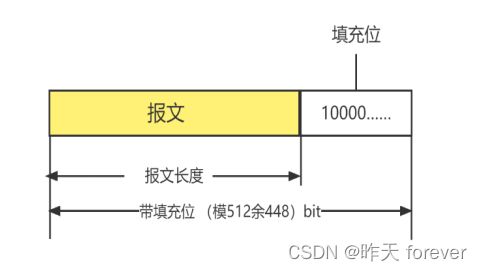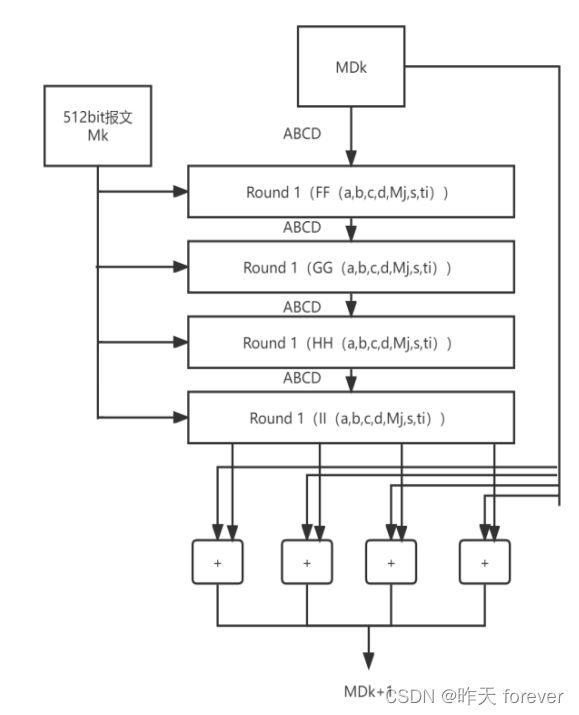- MD5的概述
MD5由美国密码学家罗纳德·李维斯特(Ronald Linn Rivest)设计,于1992年公开,是一个典型的密码散列函数,MD5方法将所有的文件看作为一个个的文本文件,通过不可逆 的字符串变化算法可以将输入的报文信息转化生成一个128位的散列值。如果报文的内容发生变化,通过哈希算法得到的散列值也会相应地发生变化。
- MD5的特点
a) MD5的过程是不可逆的
b)MD5具有高度的离散性
c)产生固定长度的输出结果
d)抵制弱碰撞性
- MD5的过程
- 添加填充位
报文的输入长度可以是任意值,首先需要对输入的报文进行填充处理,使得该报文添加填充位之后的报文长度模512余448,若输入的报文已经满足模余的要求,依旧需要进行填充512位。

图1 报文格式的填充 1
填充位最小长度位最小长度为1,最大长度为512。
- 填充长度项
填充的的最后64位表示了该报文的未补位之前的长度,大于2^64bit的报文,舍弃掉报文的整数部分,保留余数。
填充结束之后,报文的总长度为512的整数倍。

图2 填充长度项 1
- 初始化
初始化MD5的四个寄存器,每个寄存器都为32位,初始化的内容为: A=67452301
B=EFCDAB89
C=98BADCFE
D=10325476
- 分块:按照每组512比特将报文进行分组,多轮压缩:依次对于每组的内容进行单向的哈希变换,每次变换之后使寄存器的值发生变化。

图3 总的操作流程 1
第k个数据块的变化如下所示,首先保存第k-1次的ABCD的值,然后输入第k个数据块,对于ABCD的进行变换。

图4 每个分块的操作 1
在过程中用到的Disturb Functions定义如下:
FF(a,b,c,d,Mj,s,ti) a=b+(a+F(b,c,d)+Mj+ti)<
GG(a,b,c,d,Mj,s,ti) a=b+(a+G(b,c,d)+Mj+ti)<< s
HH(a,b,c,d,Mj,s,ti) a=b+(a+H(b,c,d)+Mj+ti)<< s
II(a,b,c,d,Mj,s,ti) a=b+(a+I(b,c,d)+Mj+ti)<< s
上式中:Mj(0
<<循环左移 S是表示循环左移s个bit,ti=[4294967296]*abs(sin(i))]标识操作的步骤
四个函数的Fx(b,c,d)定义如下:
F(x,y,z)=(x&y)|((~x)&z)
G(x,y,z)=(x&z)|(y&(~z))
H(x,y,z)=x^y^z
I(x,y,z)=y^(x|(~z))
当所有的报文段都处理完毕之后,最后的输出为 ABCD四个寄存器中内容的级联,从A的低字节开始,直到D的高字节。该值即为该报文的报文摘要。
A=A+AA B=B+BB
C=C+CC D=D+DD
代码实现:
#include
#include
#include
#include
#include
namespace md5 {
//UINT4 defines a four byte word
typedef unsigned int UINT4;
typedef unsigned char* POINTER;
//define four auxiliary functions
#define F(x,y,z) (((x)&(y))|((~x)&(z)))
#define G(x,y,z) (((x)&(z))|((y)&(~z)))
#define H(x,y,z) ((x)^(y)^(z))
#define I(x,y,z) ((y)^((x)|(~z)))
#define ROTATE_LEFT(x,n) (((x)<<(n))| ((x)>>(32-(n))))
using std::string;
using std::cin;
using std::cout;
using std::endl;
//
void FF(UINT4& a, UINT4 b, UINT4 c, UINT4 d, UINT4 m, UINT4 s, UINT4 t)
{
a = b + ROTATE_LEFT((a + F(b, c, d) + m + t), s);
}
void GG(UINT4& a, UINT4 b, UINT4 c, UINT4 d, UINT4 m, UINT4 s, UINT4 t)
{
a = b + ROTATE_LEFT((a + G(b, c, d) + m + t), s);
}
void HH(UINT4& a, UINT4 b, UINT4 c, UINT4 d, UINT4 m, UINT4 s, UINT4 t)
{
a = b + ROTATE_LEFT((a + H(b, c, d) + m + t), s);
}
void II(UINT4& a, UINT4 b, UINT4 c, UINT4 d, UINT4 m, UINT4 s, UINT4 t)
{
a = b + ROTATE_LEFT((a + I(b, c, d) + m + t), s);
}
typedef struct {
UINT4 state[4]; /* state (ABCD) */
UINT4 count[2]; /* number of bits, modulo 2^64 (lsb first) */
unsigned char buffer[64]; /* input buffer */
} MD5_CTX;
//Initialize MD Buffer
void MD5Init(MD5_CTX* context)
{
context->count[0] = context->count[1] = 0;
/* Load magic initialization constants.
*/
context->state[0] = 0x67452301;
context->state[1] = 0xefcdab89;
context->state[2] = 0x98badcfe;
context->state[3] = 0x10325476;
}
//k[i]=4294967296*abs(sin(i))
const unsigned int t[] = {
0xd76aa478,0xe8c7b756,0x242070db,0xc1bdceee,
0xf57c0faf,0x4787c62a,0xa8304613,0xfd469501,0x698098d8,
0x8b44f7af,0xffff5bb1,0x895cd7be,0x6b901122,0xfd987193,
0xa679438e,0x49b40821,0xf61e2562,0xc040b340,0x265e5a51,
0xe9b6c7aa,0xd62f105d,0x02441453,0xd8a1e681,0xe7d3fbc8,
0x21e1cde6,0xc33707d6,0xf4d50d87,0x455a14ed,0xa9e3e905,
0xfcefa3f8,0x676f02d9,0x8d2a4c8a,0xfffa3942,0x8771f681,
0x6d9d6122,0xfde5380c,0xa4beea44,0x4bdecfa9,0xf6bb4b60,
0xbebfbc70,0x289b7ec6,0xeaa127fa,0xd4ef3085,0x04881d05,
0xd9d4d039,0xe6db99e5,0x1fa27cf8,0xc4ac5665,0xf4292244,
0x432aff97,0xab9423a7,0xfc93a039,0x655b59c3,0x8f0ccc92,
0xffeff47d,0x85845dd1,0x6fa87e4f,0xfe2ce6e0,0xa3014314,
0x4e0811a1,0xf7537e82,0xbd3af235,0x2ad7d2bb,0xeb86d391 };
//循环左移位数
const unsigned int s[] = {
7,12,17,22,7,12,17,22,7,12,17,22,7,12,17,22,
5,9,14,20,5,9,14,20,5,9,14,20,5,9,14,20,
4,11,16,23,4,11,16,23,4,11,16,23,4,11,16,23,
6,10,15,21,6,10,15,21,6,10,15,21,6,10,15,21
};
static unsigned char PADDING[] =
{
0x80, 0, 0, 0, 0, 0, 0, 0, 0, 0, 0, 0, 0, 0, 0, 0, 0, 0, 0, 0, 0, 0,
0, 0, 0, 0, 0, 0, 0, 0, 0, 0, 0, 0, 0, 0, 0, 0, 0, 0, 0, 0, 0, 0, 0,
0, 0, 0, 0, 0, 0, 0, 0, 0, 0, 0, 0, 0, 0, 0, 0, 0, 0, 0
};
static void MD5_memcpy(POINTER output, POINTER input, unsigned int len)
{
unsigned int i;
for (i = 0; i < len; i++)
output[i] = input[i];
}
static void MD5_memset(POINTER output, int value, unsigned int len)
{
unsigned int i;
for (i = 0; i < len; i++)
((char*)output)[i] = (char)value;
}
static void MD5_print(unsigned char digest[16])
{
unsigned int i;
for (i = 0; i < 16; i++)
{
printf("%02x", digest[i]);
}
}
//8->32
static void Decode(UINT4* output, unsigned char* input, unsigned int len)
{
unsigned int i, j;
for (i = 0, j = 0; j < len; j += 4, i++)
{
output[i] = ((UINT4)input[j]) | (((UINT4)input[j + 1]) << 8) | (((UINT4)input[j + 2]) << 16) | (((UINT4)input[j + 3]) << 24);
}
}
//32->8
static void Encode(unsigned char* output, UINT4* input, unsigned int len)
{
unsigned int i, j;
for (i = 0, j = 0; j < len; i++, j += 4)
{
output[j] = (unsigned char)(input[i] & 0xff);
output[j + 1] = (unsigned char)((input[i] >> 8) & 0xff);
output[j + 2] = (unsigned char)((input[i] >> 16) & 0xff);
output[j + 3] = (unsigned char)((input[i] >> 24) & 0xff);
}
}
//md5基本转换
static void MD5Transform(UINT4 state[4], unsigned char block[64])
{
UINT4 a = state[0], b = state[1], c = state[2], d = state[3], M[16];
Decode(M, block, 64);
int i = 0;
FF(a, b, c, d, M[0], s[i], t[i]); i++;
FF(d, a, b, c, M[1], s[i], t[i]); i++;
FF(c, d, a, b, M[2], s[i], t[i]); i++;
FF(b, c, d, a, M[3], s[i], t[i]); i++;
FF(a, b, c, d, M[4], s[i], t[i]); i++;
FF(d, a, b, c, M[5], s[i], t[i]); i++;
FF(c, d, a, b, M[6], s[i], t[i]); i++;
FF(b, c, d, a, M[7], s[i], t[i]); i++;
FF(a, b, c, d, M[8], s[i], t[i]); i++;
FF(d, a, b, c, M[9], s[i], t[i]); i++;
FF(c, d, a, b, M[10], s[i], t[i]); i++;
FF(b, c, d, a, M[11], s[i], t[i]); i++;
FF(a, b, c, d, M[12], s[i], t[i]); i++;
FF(d, a, b, c, M[13], s[i], t[i]); i++;
FF(c, d, a, b, M[14], s[i], t[i]); i++;
FF(b, c, d, a, M[15], s[i], t[i]); i++;
GG(a, b, c, d, M[1], s[i], t[i]); i++;
GG(d, a, b, c, M[6], s[i], t[i]); i++;
GG(c, d, a, b, M[11], s[i], t[i]); i++;
GG(b, c, d, a, M[0], s[i], t[i]); i++;
GG(a, b, c, d, M[5], s[i], t[i]); i++;
GG(d, a, b, c, M[10], s[i], t[i]); i++;
GG(c, d, a, b, M[15], s[i], t[i]); i++;
GG(b, c, d, a, M[4], s[i], t[i]); i++;
GG(a, b, c, d, M[9], s[i], t[i]); i++;
GG(d, a, b, c, M[14], s[i], t[i]); i++;
GG(c, d, a, b, M[3], s[i], t[i]); i++;
GG(b, c, d, a, M[8], s[i], t[i]); i++;
GG(a, b, c, d, M[13], s[i], t[i]); i++;
GG(d, a, b, c, M[2], s[i], t[i]); i++;
GG(c, d, a, b, M[7], s[i], t[i]); i++;
GG(b, c, d, a, M[12], s[i], t[i]); i++;
HH(a, b, c, d, M[5], s[i], t[i]); i++;
HH(d, a, b, c, M[8], s[i], t[i]); i++;
HH(c, d, a, b, M[11], s[i], t[i]); i++;
HH(b, c, d, a, M[14], s[i], t[i]); i++;
HH(a, b, c, d, M[1], s[i], t[i]); i++;
HH(d, a, b, c, M[4], s[i], t[i]); i++;
HH(c, d, a, b, M[7], s[i], t[i]); i++;
HH(b, c, d, a, M[10], s[i], t[i]); i++;
HH(a, b, c, d, M[13], s[i], t[i]); i++;
HH(d, a, b, c, M[0], s[i], t[i]); i++;
HH(c, d, a, b, M[3], s[i], t[i]); i++;
HH(b, c, d, a, M[6], s[i], t[i]); i++;
HH(a, b, c, d, M[9], s[i], t[i]); i++;
HH(d, a, b, c, M[12], s[i], t[i]); i++;
HH(c, d, a, b, M[15], s[i], t[i]); i++;
HH(b, c, d, a, M[2], s[i], t[i]); i++;
II(a, b, c, d, M[0], s[i], t[i]); i++;
II(d, a, b, c, M[7], s[i], t[i]); i++;
II(c, d, a, b, M[14], s[i], t[i]); i++;
II(b, c, d, a, M[5], s[i], t[i]); i++;
II(a, b, c, d, M[12], s[i], t[i]); i++;
II(d, a, b, c, M[3], s[i], t[i]); i++;
II(c, d, a, b, M[10], s[i], t[i]); i++;
II(b, c, d, a, M[1], s[i], t[i]); i++;
II(a, b, c, d, M[8], s[i], t[i]); i++;
II(d, a, b, c, M[15], s[i], t[i]); i++;
II(c, d, a, b, M[6], s[i], t[i]); i++;
II(b, c, d, a, M[13], s[i], t[i]); i++;
II(a, b, c, d, M[4], s[i], t[i]); i++;
II(d, a, b, c, M[11], s[i], t[i]); i++;
II(c, d, a, b, M[2], s[i], t[i]); i++;
II(b, c, d, a, M[9], s[i], t[i]); i++;
state[0] += a;
state[1] += b;
state[2] += c;
state[3] += d;
MD5_memset((POINTER)M, 0, sizeof(M));
}
void MD5_Update(MD5_CTX* context, unsigned char* input, unsigned int inputLen)
{
unsigned int i, index, partLen;
//padding
index = (UINT4)((context->count[0] >> 3) & 0x3F);
//进位
if ((context->count[0] += ((UINT4)inputLen << 3)) < ((UINT4)inputLen << 3))
{
context->count[1]++;
}
context->count[1] += ((UINT4)inputLen >> 29);
partLen = 64 - index;
if (inputLen >= partLen)
{
MD5_memcpy((POINTER)&context->buffer[index], (POINTER)input, partLen);
MD5Transform(context->state, context->buffer);
for (i = partLen; i + 63 < inputLen; i += 64)
MD5Transform(context->state, &input[i]);
index = 0;
}
else
i = 0;
MD5_memcpy
((POINTER)&context->buffer[index], (POINTER)&input[i], inputLen - i);
}
string toHex(UINT4 num)
{
int x;
string tp;
char HexArray[] = "0123456789abcdef";
string str = "";
for (int i = 0; i < 4; i++)
{
tp = "";
x = ((num >> i * 8) % (1 << 8)) & 0xff;
for (int j = 0; j < 2; j++)
{
tp.insert(0, 1, HexArray[x % 16]);
x /= 16;
}
str += tp;
}
return str;
}
string MD5_Final(unsigned char digest[16], MD5_CTX* context)
{
unsigned char bits[8];
unsigned int index, padLen;
Encode(bits, context->count, 8);
//填充操作
index = (unsigned int)((context->count[0] >> 3) & 0x3f);
padLen = (index < 56) ? (56 - index) : (120 - index);
MD5_Update(context, PADDING, padLen);
//长度
MD5_Update(context, bits, 8);
string s = "";
for (int i = 0; i < 4; i++)
s += toHex(context->state[i]);
cout << s;
//摘要中的存储状态
Encode(digest, context->state, 16);
MD5_memset((POINTER)context, 0, sizeof(*context));
return s;
}
string MDString(char* string)
{
MD5_CTX context;
char* digest = new char[16];
unsigned int len = strlen(string);
MD5Init(&context);
MD5_Update(&context, (unsigned char*)string, len);
std::string s = MD5_Final((unsigned char*)digest, &context);
//MD5_print((unsigned char*)digest);
return s;
}
string MDFile(char* filename)
{
MD5_CTX context;
int len;
unsigned char buffer[1024], digest[16];
std::fstream inFile;
inFile.open(filename, std::ios::binary | std::ios::in);
if (!inFile.is_open()) {
cout << "Could not open the file:" << endl;
cout << "Program terminating!\n";
exit(EXIT_FAILURE);
}
else
{
MD5Init(&context);
while (inFile.good() && !inFile.eof())
{
inFile.read((char*)buffer, 1024);
MD5_Update(&context, buffer, inFile.gcount());
}
std::string s = MD5_Final(digest, &context);
//MD5_print(digest);
return s;
}
}
}



